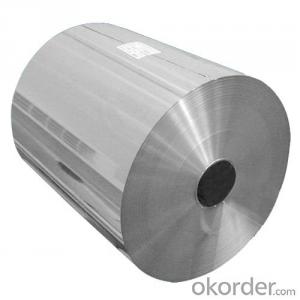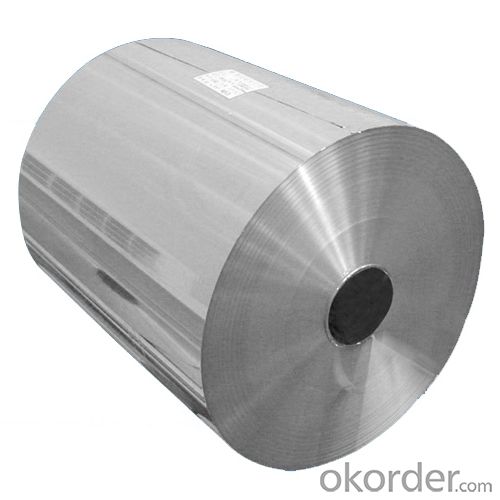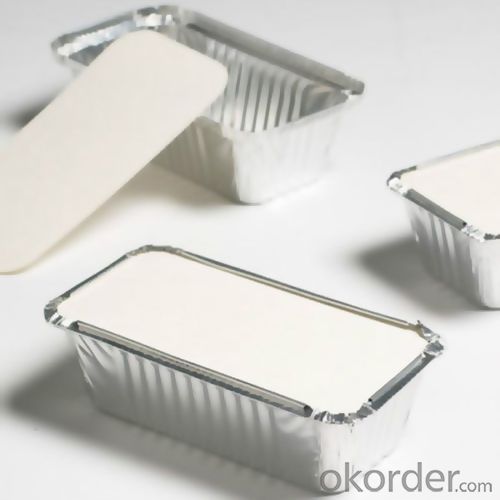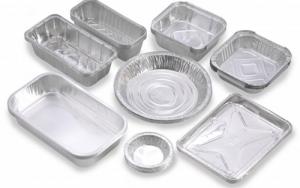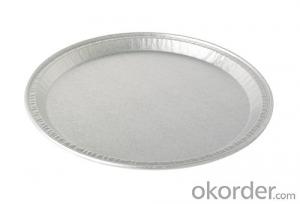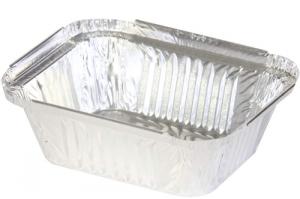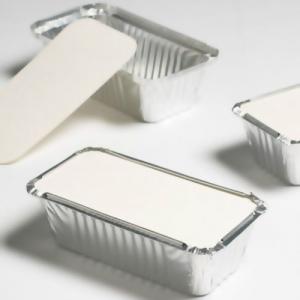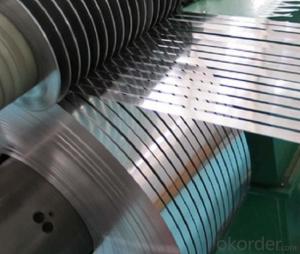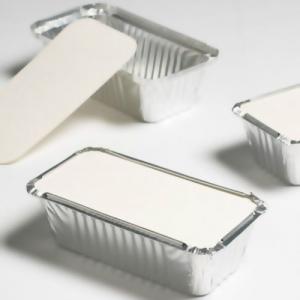Customized Painted Aluminum Coil for Food Container Trays in Jumbo Roll
- Loading Port:
- China main port
- Payment Terms:
- TT OR LC
- Min Order Qty:
- 3 m.t
- Supply Capability:
- 10000 m.t/month
OKorder Service Pledge
OKorder Financial Service
You Might Also Like
Specification
1. Description of Aluminium Foil in Jumbo Roll for Food Container Trays
Aluminum foil aluminum alloy :1235 /8011/8079
Aluminum foil width and length :according to your request
Aluminum foil Core ID :76.2mm &152mm
Aluminum foil temper : o /h12 / h24
Final usage: insulation aluminum foil / lidding aluminum foil /tag and lable aluminum foil / container aluminum foil / food and pharmaceutical packing foil / cigarette aluminum foil
2. Specifications of Aluminium Foil in Jumbo Roll for Food Container Trays
Alloy: 8011 / 3003
Temper: O / H22 / H24
Thickness & tolerance: 0.05 - 0.2 mm (+/- 8%)
Width & tplerance: 200 - 1650 mm (+/- 1mm)
Mechanical properties: Tensile strength (U.T.S)≥49 Mpa, Elongation≥1%
Standard: GB/T 3198 / ASTM - B209 / EN546
3. Feature of Aluminium Foil in Jumbo Roll for Food Container Trays
*Such coil is specially designed to replace aluminum ingot, due to the high export tax of aluminum ingot, the coil has better price than ingot.
*This type of coil can fit customer's remelting furnace just like ingot, no need to make any change to the production line that was previously used for ingot. The standard coil size and weight is very suitable for the feed gate of furnace.
*This type of coil causes less material wastage than ingot when remelted.
*Our coil is made directly from ore, no need to go though the ingot making process, quality is much better than other suppliers who use ingot scrap to make coil.
Be free from Oil Stain, Dent, Inclusion, Scratches, Stain, Oxide Dicoloration, Breaks, Corrosion, Roll Marks, Dirt Streaks and other defect which will interfere with use
4. Certificate:
SGS and ROHS(if client request, paid by client), MTC(plant provided), Certificate of Origin(FORM A, FORM E, CO), Bureau Veritas and SGS (if client request, paid by client), CIQS certificate
5. Image of Aluminium Foil in Jumbo Roll for Food Container Trays
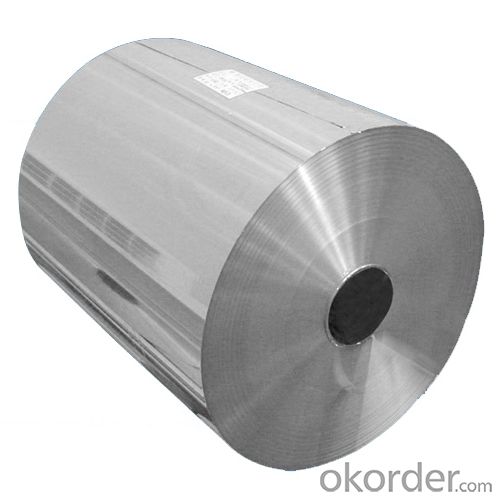
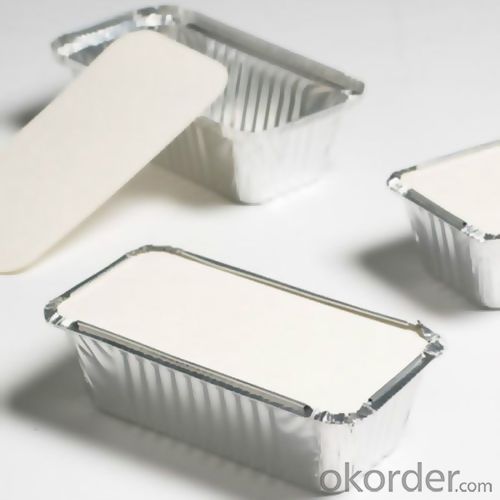
6. Package and shipping of Aluminium Foil in Jumbo Roll for Food Container Trays
eye to sky
eye to wall
with wooden pallet (wooden case also available)
7. FAQ
1) What is the delivery time?
Dpends on actual order, around 20 days
2) What is the QC system:
We have QC staff of 20 persons and advanced equipment, each production is with MTC traced from Aluminum ingot lot.
3) What market do you mainly sell to?
Australia, America, Asia, Middle East, Western Europe, Africa etc
- Q: How do aluminum coils compare to nickel coils in terms of conductivity?
- Compared to nickel coils, aluminum coils typically exhibit lower electrical conductivity. This is mainly attributable to the fact that aluminum has a higher resistivity than nickel. Concerning conductivity, nickel emerges as a superior electrical conductor owing to its lower resistivity. Consequently, nickel coils are frequently favored in situations where high conductivity is vital, like in electrical circuits or heating elements. Nonetheless, it is crucial to acknowledge that aluminum coils still possess reasonable conductivity and may prove suitable for specific applications where cost-effectiveness or lightweight properties outweigh other considerations.
- Q: What certifications might be necessary for the production, sale, or use of aluminum coils?
- <p>Aluminum coils may require various certifications depending on their intended use and the standards set by different countries or industries. Common certifications include ISO 9001 for quality management systems, ISO 14001 for environmental management, and specific industry standards such as ASTM or EN standards for material properties and safety. For construction or automotive applications, additional certifications like CE marking in Europe or DOT certification in the US may be necessary. It's crucial to consult with industry standards and regulatory bodies to determine the exact certifications required for a specific application.</p>
- Q: Can aluminum coils be used in refrigeration systems?
- Yes, aluminum coils can be used in refrigeration systems. Aluminum is a common material choice for evaporator coils in refrigeration systems due to its excellent heat transfer properties, corrosion resistance, and lightweight nature.
- Q: Are aluminum coils suitable for reflective insulation?
- Yes, aluminum coils are suitable for reflective insulation. Aluminum is highly reflective and has low emissivity, which means it can effectively reflect radiant heat. This makes it an ideal material for reflective insulation, as it helps to reduce heat transfer by reflecting radiant energy away from the insulated space. Aluminum coils are commonly used in reflective insulation products such as foil-faced insulation boards and radiant barriers.
- Q: Can aluminum coils be used in the production of aluminum honeycomb panels?
- Aluminum honeycomb panels can indeed incorporate aluminum coils in their production process. To create these panels, aluminum sheets are affixed to a honeycomb core material, typically composed of aluminum as well. The aluminum coils are commonly employed to manufacture the aluminum sheets forming the panels' outer layer. After being rolled into thin sheets, these coils are cut to the desired dimensions and subsequently bonded to the honeycomb core. The utilization of aluminum coils enables the efficient and cost-effective manufacture of aluminum honeycomb panels, as they can be easily molded and processed to meet the necessary shape and size requirements. Moreover, aluminum possesses the qualities of being lightweight and durable, rendering it an optimal selection for fabricating honeycomb panels utilized in diverse industries, including aerospace, construction, and transportation.
- Q: How are aluminum coils tested for quality and performance?
- Aluminum coils are tested for quality and performance through a series of rigorous inspection processes. These tests aim to assess the mechanical, chemical, and physical properties of the coils to ensure they meet the required standards. One common test conducted is the visual inspection, where trained technicians examine the surface of the aluminum coils for any visible defects such as scratches, dents, or irregularities in shape. This step is crucial as it helps identify any cosmetic flaws that may affect the overall performance and quality of the coils. Another important test is the dimensional inspection, which involves measuring the thickness, width, and length of the coils to ensure they meet the specified tolerances. This test is critical as it helps guarantee the coils will fit properly in their intended applications and perform optimally. To assess the mechanical properties, various mechanical tests are conducted. One such test is the tensile strength test, which measures the maximum amount of stress a coil can withstand before breaking. This test helps determine the strength and durability of the coils under different operating conditions. Additionally, the hardness test is performed to evaluate the resistance of the coils to indentation or scratching. This test provides insights into the coil's ability to withstand wear and tear, ensuring its longevity. Chemical analysis is another vital aspect of quality testing. The chemical composition of the aluminum coils is examined to ensure it meets the required standards and does not contain any impurities or elements that may compromise the performance or safety of the coils. Furthermore, to assess the thermal properties of the coils, thermal conductivity tests are conducted. These tests measure the coil's ability to conduct heat efficiently, ensuring that it can effectively dissipate heat in applications where it is used. In addition to these tests, other performance evaluations may be conducted depending on the specific application of the aluminum coils. This could include corrosion resistance tests, fatigue tests, or even electrical conductivity tests. These evaluations help determine the coil's ability to perform under different conditions and ensure its reliability and longevity. By subjecting aluminum coils to these comprehensive quality and performance tests, manufacturers can ensure that only the highest quality coils are delivered to customers, meeting their expectations and standards.
- Q: This question asks about the impact of aluminum coils on safety and health protection during welding processes.
- <p>Aluminum coils can significantly affect welding safety and health protection due to their unique properties. Aluminum is lighter than steel and conducts heat quickly, which can lead to faster heat transfer to the welder, increasing the risk of burns. Additionally, aluminum welding produces fumes that contain aluminum oxide, which can be harmful if inhaled over time, potentially causing respiratory issues or even neurological damage. Welders must use proper ventilation and respiratory protection to mitigate these risks. Moreover, aluminum's high reflectivity can cause intense light exposure, necessitating the use of appropriate eye protection to prevent eye injuries. Overall, aluminum welding requires specific safety measures to protect welders' health and safety.</p>
- Q: Are aluminum coils susceptible to warping or bending?
- Yes, aluminum coils are susceptible to warping or bending. Aluminum, although lightweight and highly corrosion-resistant, is a relatively soft metal compared to other materials like steel. This means that it is more prone to bending or warping under certain conditions. Factors such as excessive heat, heavy loads, or improper handling can cause aluminum coils to deform. It is important to handle and store aluminum coils carefully to prevent any damage or distortion. Additionally, proper installation techniques and maintenance practices can help minimize the risk of warping or bending.
- Q: Is it possible to customize the dimensions of aluminum coils?
- Indeed, the dimensions of aluminum coils can be tailored to suit individual preferences. Customers are able to request and obtain aluminum coils that have been manufactured and trimmed to specific measurements in accordance with their particular requirements and specifications. This customization procedure entails the meticulous cutting and molding of the aluminum coil in order to achieve the desired dimensions. This capability offers versatility across a range of industries and applications, where precise coil sizes are indispensable. By customizing the dimensions of aluminum coils, they become perfectly compatible with various production procedures, machinery, or end-use applications.
- Q: I have a mig welder, and I would like to learn to weld aluminum. I have been told that I must buy an aluminum wire spool gun, because the standard mig wire feeder gun will not work with aluminum wire. I don't understand why my standard wire feeder will not work. It feeds wire just like a spool gun. Why do I need to spend money on a spool gun just to weld aluminum? If a spool gun is truly necessary, where can i find one for a reasonable price? Thanks for your help!
- NO okorder /
Send your message to us
Customized Painted Aluminum Coil for Food Container Trays in Jumbo Roll
- Loading Port:
- China main port
- Payment Terms:
- TT OR LC
- Min Order Qty:
- 3 m.t
- Supply Capability:
- 10000 m.t/month
OKorder Service Pledge
OKorder Financial Service
Similar products
Hot products
Hot Searches
Related keywords
